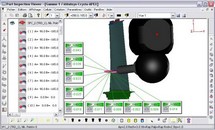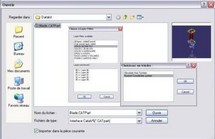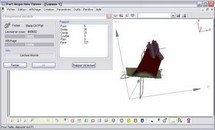- Join our Team
- Resources
-
Account
- |
- Cart
- EN FR
Close collaboration between MDTVISION and Datakit to get digital data

January 01, 07
Prelude INSPECTION is the 3D metrology solution developed by MDTVISION. As an IBM subsidiary, the company's goal is to develop the group's PLM strategy in France and deploy solutions for specific business areas and consultancy for customers in manufacturing.
A key to the ability to offer, integrate and enable interoperation between different CAD and measurement systems and QC equipment is to have an open and independent solution.
Prelude INSPECTION interconnects with most portable 3D measuring
systems and with a range of measurement systems such as laser trackers or contactless measuring sensors ... It is based on integrating
QC as far upstream as possible in the product process, right into
the heart of the CAD/CAM environment, the goals being to approve
not only parts before they are made but also the corresponding
die and mould designs. This will give metrologists a tool capable
of detecting any possible errors affecting the manufacturing process,
whatever the work, cutting out any excess quality costs. INSPECTION
enables the approval not only of tools, prototypes, production
and finished parts, but also of processes as a whole.

Prelude INSPECTION offers both online and offline modes, automatic route sheet generation and produces graphic measurement reports. Advanced optimisation functions enable point file rectification to identify discrepancies or work on edges, while maintaining precise tolerances to highlight any needs to reverse engineer specific areas of the processed CAD model.
The ability to get reliable data is a key aspect of ensuring that the software operates successfully. Prelude INSPECTION uses the CAD model as a basis for its digital coordinate system.
For many years now, MDTVISION has been integrating DATAKIT's data exchange technology.

The interfaces for reading CATIA V4, CATIA V5, UG and Pro-E data have been brought to users in forge, moulding, toolmaking and prototyping environments to enable them to read native files. Jean-Yves Detoc, head of QC at MDTVISION, explains why the company has gone with Datakit: “one of our priorities is to be sure that users in metrology are independent. Datakit's interfaces are particularly good at managing colours, layers and the axis systems of parts and assemblies. This saves metrologists from having to systematically contact the design office or spend hours trawling through information that is only available in drawing sets. With Datakit, we have an out-of-the-box product, that is scalable and leaves us free to get on with our business, and generate our added value”.
The integration of the Datakit solutions is transparent to end users who simply select their CATParts, CATProducts, Prt, Asm or other files and validate their selection with the preview function.
Jean-Yves Detoc says that the precision of the data exchange is rarely a problem. Approximation is negligible. The problem is more about sorting the data that is relevant for the checks. “By using filters we are able to select the data that we want to access, such as the nominal geometry of the end part ready for assembly, or construction data (for example the press tool with the shape of the stamped part). For users, the question of the reference system in which they will be working is equally essential. The ability to choose a working coordinate system enables users to switch from the vehicle's global coordinate system to that of the press tool. The ability to display colours also make it easier to get an immediate understanding of the assembly and consequently select the part or parts that you want to check. These functions are an integral part of the toolbox that we offer metrologists.”
The teams at MDTVISION and Datakit have been working together for years and have developed a close relationship. The big CATProducts files delivered by MDTVISION have become a regular feature of many a working environment, and Datakit is proud of its ability today to flawlessly process complex assemblies and all their component parts.